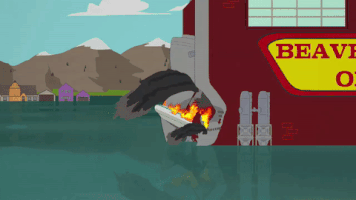The Environment has been a hot topic in politics recently since President Trump does not believe in climate change. Considering many people are talking about the future of the Environmental Protection Agency there are also a handful of people who have no clue what it does.
I constantly see people saying that the EPA has no impact on them, but their information is mislead. The EPA not all about saving the environment and this false "anti-industry-anarchy" type stigma that comes with people who care for it.
1. Mission: "To protect human health and the environment."
This is taken directly from the EPA website. In many ways the state of the environment is a human issue. Things such as water quality, air pollution, releasing of toxic waste, construction side affects, and more have not only detrimental effects on wildlife, but people.
2.Clean Air Act
This 1970's piece of legislation regulates the emissions from stationary and mobile pollution point sources. "Clean Air Act programs have lowered levels of six common pollutants -- particles, ozone, lead, carbon monoxide, nitrogen dioxide and sulfur dioxide -- as well as numerous toxic pollutants".
The 1990 Clean Air Act Prevents:
| Year 2010 (in cases) | Year 2020 (in cases) | |
|---|---|---|
| Adult Mortality - particles | 160,000 | 230,000 |
| Infant Mortality - particles | 230 | 280 |
| Mortality - ozone | 4300 | 7100 |
| Chronic Bronchitis | 54,000 | 75,000 |
| Heart Disease - Acute Myocardial Infarction | 130,000 | 200,000 |
| Asthma Exacerbation | 1,700,000 | 2,400,000 |
| Emergency Room Visits | 86,000 | 120,000 |
| School Loss Days | 3,200,000 | 5,400,000 |
| Lost Work Days | 13,000,000 | 17,000,000 |
According to a Benefit-Cost Analysis done by the EPA(can see it by clicking on the hyperlink above the graph), the costs of the Clean Air Act with the 1990 amendments total to $65 Billion where as the benefits are $2 trillion. Any economics major would tell you that the Clean Air Act and it's amendments are positive.
3. Clean Water Act
The Clean Water Act of 1972, originally the Federal Water Pollution Control Act (1948), controls wastewater via permits and standards. Examples of waste water would be water coming from houses (toilet, shower, dishwasher, etc), agriculture (when it has too many pesticides,fertilizers, etc for human use), sewage, groundwater that was contaminated (i.e. pollution leakage) and waster used in different industrial processes.
For example, the CWA makes it illegal to dump from a point source (a specific location) without a permit or supervision. This prevents people from throwing their waste into YOUR drinking water. If you want the EPA gone, you might as well go drink the juices from the bottom of a trash bag.
The EPA works with this act as well as the Safe Drinking Water Act to ensure that people are living healthy lifestyles.
4. Toxic Substances Control Act

Next time someone tells you that the EPA is not important, tell them to go live in a third world country where there is no one regulating the water. See how they like drinking someone else's bath water. In my opinion, we are lucky to have been left with this agency to protect our health. Life, liberty and the pursuit of happiness? How are any of these supposed to be fulfilled if we are too sick to function?



























